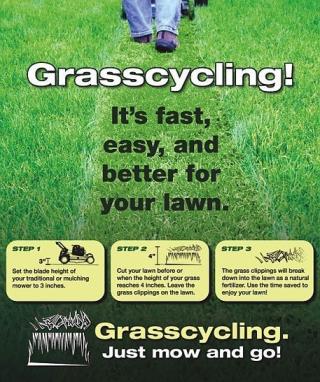Grass - Cut it and Leave It!

Grass – Cut It and Leave It Environmentally-Friendly Lawn Care
Grass clippings are a major part of New Jersey’s municipal solid waste stream. As a New Jersey resident, you are already helping to avoid air pollution and wasted resources by recycling. You can do more by reducing waste at the source. Leave the grass clippings on your lawn when you mow, and let nature do the recycling. Just cut it and leave it to save time and money You’ll save 20-25% of your time because you won’t have to stop and empty your lawnmower bag, and you’ll avoid purchasing yard waste bags and hauling them to the curb. You’ll need to fertilize less (25-50%), since clippings return nutrients to the soil. Mow your lawn correctly To maintain your lawn properly, mow high and mow often, so that you only take off about 1/3 of the length of the grass. This will result in an attractive, neatly trimmed lawn, and clippings will disappear when they filter down to the soil.
Most New Jersey lawns should be mowed 2 ½ - 3 ½ inches high (like the rough beside a golf course fairway), especially in summer, to shade the soil, cool the roots, and block weed growth. Mulching mowers help you do this; they chop the clippings into fine pieces that slip easily down to the soil. Most new mowers are mulching mowers, and you can attach mulching equipment to your existing mower. The right amount of water Controlling watering rates will help your lawn grow at manageable levels and still stay healthy. Don’t water until the lawn is dry. If it turns blue-green or gray, or if footprints don’t spring back, it’s time to water. Provide about an inch at a time for clay soil, and half an inch for sandy soil. Place a few cans around the lawn and note how long it takes for that much water to collect. Even in dry periods, lawns usually need a thorough watering only once a week, or twice if soils are sandy. If managed carefully, water will soak the soil four to six inches down, just right for building healthy root systems and greener growth. Early morning watering conserves water by preventing evaporation.
What to do with excessive growth If you miss a week, or if heavy rain causes fast growth, you have some choices.
Double mow
Set the mower higher than usual and cut no more than the top third of the grass. In a day or two, set the mower height down and bring the lawn mower down another 1/3 of its height. Continue this process until you reach the desired height.
Mulch heavy clippings into the garden
Bag or rake the clippings and apply them to your garden as mulch. Spread them an inch deep, to cool the soil, retain water, prevent erosion and compaction, and smother weed seeds.
Mix them with the soil
New Jersey soils can be improved by adding organic matter. Added organic materials make heavy clay soils become more productive, and sandy soils retain more water.
Compost
Grass speeds up your composting, but can cause odors and deplete oxygen if not properly managed. If you compost large amounts of grass, turn the pile often with a pitchfork.
What about thatch?
Clippings don’t cause thatch. Thatch is formed from the accumulation of dead roots and stems. The more you fertilize and water your lawn, the more it grows and the faster thatch accumulates.
Lawn additives
Many people apply too many lawn products, too often. It costs money and may harm the lawn. Better to evaluate problems and apply only what you need. Let your County Agriculture Extension Agents give you expert advice on care and disease treatment. You can find lawn care publication at www.rce.rutgers.edu/.
Every year in New Jersey, dozens of people poison themselves taking care of their own lawns because they don’t take product label warnings seriously, and they think that more is better. Lawn additives are powerful chemicals, and you need to use them correctly.
http://www.nj.gov/dep/dshw/recycling/Grass%20Cut%20It%20and%20Leave%20It.pdf

